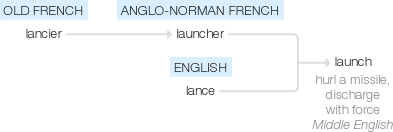Launch
Middle English (in the sense ‘hurl a missile, discharge with force’): from Anglo-Norman French launcher, variant of Old French lancier (see lance).
wiktionary
From Middle English launchen(“to throw as a lance”), Old French lanchier, another form (Old Northern French/Norman variant, compare Jèrriais lanchi) of lancier, French lancer, from lance.
From Portuguese lancha(“barge, launch”), apparently from Malay lancar(“quick, agile”). Spelling influenced by the verb above. [1]
etymonline
launch (v.)
c. 1300, "to rush, plunge, leap, start forth; to be set into sudden motion," from Old North French lancher, Old French lancier "to fling, hurl, throw, cast," from Late Latin lanceare "wield a lance," from Latin lancea "light spear" (see lance (n.)).
Meaning "to throw, hurl, let fly" is from mid-14c. Sense of "set (a boat) afloat" first recorded c. 1400, from notion of throwing it out on the water; generalized by 1600 to any sort of beginning. Related: Launched; launching.
launch (n.1)
"a leap or a bound," mid-15c., from launch (v.). Meaning "place where a boat is launched" is from 1711. Meaning "the liftoff of a missile, spacecraft, etc." is from 1935. Launch pad attested from 1960.
launch (n.2)
"large boat carried on a warship," 1690s, from Portuguese lancha "barge, launch," apparently from Malay (Austronesian) lancharan, from lanchar "quick, agile;" if so, the English spelling has been influenced by launch (v.).
